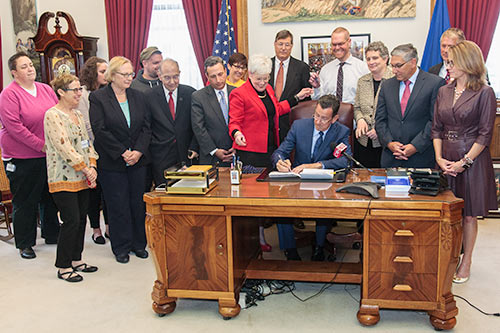Senate Votes to Prevent Practice of Discredited ‘Conversion Therapy’ in Connecticut

Governor Dannel Malloy signs House Bill 6695 into law minutes after it was passed in the State Senate as legislators and advocates look on.
Senate Democrats today led the overwhelming and bipartisan passage in the state Senate of a bill that would prohibit the practice of “conversion therapy” in Connecticut, a discredited practice in which a health care provider attempts to counsel and change a minor’s sexual orientation.
The bill passed the Senate today on a unanimous bipartisan vote and was immediately transmitted to Governor Malloy’s office for his signature. The bill passed the state House of Representatives last week on a bipartisan and overwhelming 141-8 vote.
“Gay conversion therapy targeted at minors and children is a cruel and dangerous practice which can have long lasting consequences,” said Senate President Pro Tempore Martin M. Looney (D-New Haven). “LGBTQ youth aren’t broken and don’t need to be fixed; they need our love and acceptance. Today’s vote in the Senate will ensure that this practice has no place in Connecticut.”
“Connecticut has always been a leader on issues of equality,” said Senate Majority Leader Bob Duff (D-Norwalk). “It is important that we sent a strong message by passing this legislation banning “conversion therapy”, a discredited practice designed to change a person’s sexual orientation or gender identity.
House Bill 6695 prohibits health care providers or anyone “conducting trade or commerce” in Connecticut from practicing or administering “conversion therapy,” which is generally defined as any practice or treatment that seeks to change a minor’s sexual orientation or gender identity. The bill specifies certain types of counseling that are not considered conversion therapy, such as counseling that is intended to assist a person undergoing gender transition.
“At its most basic level this bill helps support the emotional and physical health of young people who are going through a very difficult time in their lives, discovering their sexuality and coming to terms with that in a society which—even in 2017—is not always as accepting as it should be of America’s LBGTQ citizens. So it holds licensed professionals and others to a very high standard of behavior,” said Senator Beth Bye (D-West Hartford), a co-sponsor of the bill who led the Senate debate on the issue. “I think more importantly, this bill sends the message that homosexuality is not wrong, there is nothing to ‘fix.’ Hundreds of professional medical organizations have determined that, and our U.S. Supreme Court even ruled last week that there is no religious grounds for conversion therapy. So today was a big step forward for Connecticut in the arena of civil rights, and I am thankful to my Democratic and Republican colleagues for their overwhelming support of this bill. I think young people should take some comfort in the fact that both Democrats and Republicans in the Senate, people who are sometimes on the opposite sides of an issue, joined together today to support this bill and to support the teenagers who we seek to serve.”
Under the bill, if any health care provider in Connecticut did engage in conversion therapy, it would be considered unprofessional conduct subject to disciplinary action. If anyone practiced conversion therapy while conducting trade or commerce, it would be deemed an unfair or deceptive trade practice. The bill also prohibits public funds from being spent on conversion therapy or any related actions.